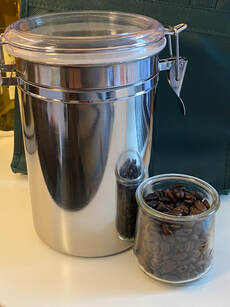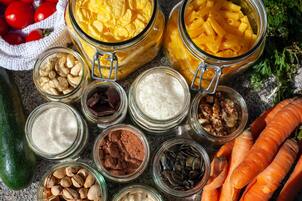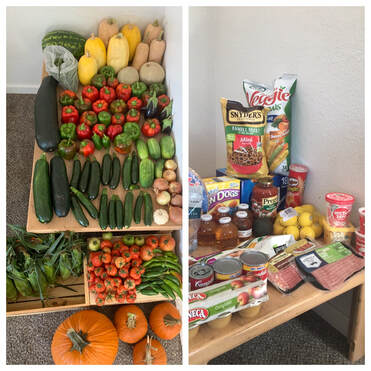
I really should have made this my first blog because this is one of the most impactful areas any individual or family can tackle in reducing their household waste.
There are three big factors that are going to determine your success in reducing food packaging
Time, Budget and Access
Time:
And with time I’m also going to lump your cooking ability or how much you enjoy making things from scratch. It is possible to make A LOT of your family’s favorite snacks and staples from scratch, but there will most likely be a lot of trial and error along the way. So if you don’t have the time or patience for a lot of cooking and baking, you’re going to have trouble here.
The things I have been able to make from scratch and with bulk ingredients: bread, granola bars, Cheez-it/goldfish style crackers, fruit leather, gram crackers, pie (including crust), frosting, tortillas, pasta, pop tarts, almond and oat milks, ranch dressing, Greek dressing, soft pretzels, brownies, muffins, salsa, guacamole, black bean burgers and applesauce.
Some things came out better than others and some things are labor intensive enough that I just don’t have time to make them often. But I really do try to pick one or two things a month that I no longer want to buy packaged and I try out a couple recipes until I find the one I like enough to want to try to perfect. I then dedicate to not buy that food packaged again, if I want it, I have to make it.
Budget:
My son has recently discovered a love of ketchup and mustard. When we ran out of ketchup, I decided I had to find it in a glass bottle that I could reuse until I have time to try out some recipes. I found it at the local co-op after trying 3 other stores, but it’s almost four times as much per ounce then it’s plastic packaged competitors. I know not everyone can justify that. I do feel like I generally balance out my food budget because making things from scratch TENDS to be cheaper than ready made (not always the case, cheese crackers use an ungodly amount of cheese, it adds up). But overall, I do find myself splurging on something better packaged or unpackaged and each time I do, I hear that voice in the back of my head that says “Not everyone can do this”. A good example is milk. My kids still drink cows milk and I occasionally use it for cooking. I have discovered a number of local brands that sell half gallons in glass bottles that you pay a $2 deposit which you can get back when you bring the empty, clean bottle back to the store. But this milk costs $3.50-$6 depending on the brand and store, so you could be shilling out up to $8 to bring it home.
Access:
Lots of places don’t even have that glass bottle option. They don’t have organic produce or bulk bins or even value packs and large paper or burlap bags of staples like flour or rice. And access has even changed thanks to the threat of Covid as many bulk food sections no longer allow you to use your own containers or they might be closed altogether. Addressing food deserts has to be part of the sustainability narrative going forward.
I will do a longer more detailed blog post on ZW grocery shopping when all my favorite bulk sections are back up and running, but this gives you an idea of some of the hurdles to overcome and things you can start thinking about now.
There are three big factors that are going to determine your success in reducing food packaging
Time, Budget and Access
Time:
And with time I’m also going to lump your cooking ability or how much you enjoy making things from scratch. It is possible to make A LOT of your family’s favorite snacks and staples from scratch, but there will most likely be a lot of trial and error along the way. So if you don’t have the time or patience for a lot of cooking and baking, you’re going to have trouble here.
The things I have been able to make from scratch and with bulk ingredients: bread, granola bars, Cheez-it/goldfish style crackers, fruit leather, gram crackers, pie (including crust), frosting, tortillas, pasta, pop tarts, almond and oat milks, ranch dressing, Greek dressing, soft pretzels, brownies, muffins, salsa, guacamole, black bean burgers and applesauce.
Some things came out better than others and some things are labor intensive enough that I just don’t have time to make them often. But I really do try to pick one or two things a month that I no longer want to buy packaged and I try out a couple recipes until I find the one I like enough to want to try to perfect. I then dedicate to not buy that food packaged again, if I want it, I have to make it.
Budget:
My son has recently discovered a love of ketchup and mustard. When we ran out of ketchup, I decided I had to find it in a glass bottle that I could reuse until I have time to try out some recipes. I found it at the local co-op after trying 3 other stores, but it’s almost four times as much per ounce then it’s plastic packaged competitors. I know not everyone can justify that. I do feel like I generally balance out my food budget because making things from scratch TENDS to be cheaper than ready made (not always the case, cheese crackers use an ungodly amount of cheese, it adds up). But overall, I do find myself splurging on something better packaged or unpackaged and each time I do, I hear that voice in the back of my head that says “Not everyone can do this”. A good example is milk. My kids still drink cows milk and I occasionally use it for cooking. I have discovered a number of local brands that sell half gallons in glass bottles that you pay a $2 deposit which you can get back when you bring the empty, clean bottle back to the store. But this milk costs $3.50-$6 depending on the brand and store, so you could be shilling out up to $8 to bring it home.
Access:
Lots of places don’t even have that glass bottle option. They don’t have organic produce or bulk bins or even value packs and large paper or burlap bags of staples like flour or rice. And access has even changed thanks to the threat of Covid as many bulk food sections no longer allow you to use your own containers or they might be closed altogether. Addressing food deserts has to be part of the sustainability narrative going forward.
I will do a longer more detailed blog post on ZW grocery shopping when all my favorite bulk sections are back up and running, but this gives you an idea of some of the hurdles to overcome and things you can start thinking about now.



 RSS Feed
RSS Feed